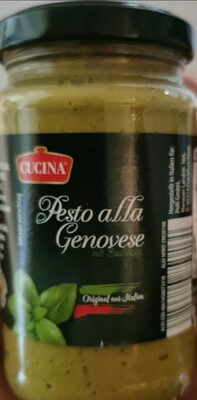
Barcode: 4061458073318
Pesto Allah Genovese
DOUBTFUL
📝 Reason: The product contains ingredients like Grana Padano and Pecorino Romano cheese which may contain animal rennet not specified as Halal, and flavorings (Aromen) with unspecified sources, making the product Doubtful (2) for Halal compliance. Islamic sources emphasize the importance of knowing the source of ingredients, especially those derived from animals, to ensure they are Halal.
📄 Certificates: None
Ingredients:
Details
Pesto Allah Genovese: Overview
Pesto Allah Genovese is a flavorful sauce primarily made from fresh basil, oils, and cheese. It has grown in popularity for its unique taste and versatility in various dishes. However, if you follow a halal diet, the halal status of Pesto Allah Genovese may raise questions. Let’s take a closer look at its ingredients and examine their halal compliance.
Halal Status: Doubtful
The halal status of Pesto Allah Genovese is marked as doubtful. This designation stems from the presence of certain ingredients that introduce ambiguity regarding their halal compliance. Notably, both Grana Padano and Pecorino Romano cheeses are known to contain animal rennet, which is often not sourced or specified as halal. Additionally, the product includes flavorings (Aromen) whose origins are unspecified, thus heightening uncertainty about the overall halal integrity.
Ingredients Breakdown
- Sonnenblumenöl: This sunflower oil is a vegetable oil and is generally considered halal.
- Basilikum: Fresh basil is an herb widely regarded as halal.
- Cashewkerne: These nuts are also halal-friendly.
- Grana Padano Kâse: A type of cheese that often contains animal rennet, with no halal assurance provided.
- Milcheiweiß: Milk protein is generally accepted as halal.
- Pecorino Romano Kâse: Similar to Grana Padano, this cheese may include animal rennet, making it a point of concern.
- Zucker: Sugar is generally considered halal.
- Natives Olivenöl extra: Extra virgin olive oil is halal-friendly.
- Knoblauch: Garlic is another ingredient that is halal.
- Aromen: Flavorings whose sources are vague pose potential halal issues.
- Milchsäure (E270): Lactic acid is typically halal.
- Ascorbinsäure (E300): Ascorbic acid is also generally considered halal.
Understanding E-numbers and Their Halal Status
E-numbers, which are codes for substances used as food additives, can be tricky when determining halal compliance. Here’s what you need to know about the significant E-numbers in Pesto Allah Genovese:
- E270 (Milchsäure): Lactic acid, primarily derived from fermentation. This additive is considered halal.
- E300 (Ascorbinsäure): Ascorbic acid is a vitamin that is also recognized as halal.
Despite the presence of these halal E-numbers, the potential for non-halal ingredients such as animal rennet cannot be overlooked. Many Muslims prioritize knowing the precise sources of all ingredients in their food to ensure compliance with dietary laws.
Brand and Certification Context
Pesto Allah Genovese currently has no halal certification, which further contributes to its doubtful halal status. Without proper certification from credible halal authorities, consumers cannot be assured that the product meets the requisite standards.
In summary, while some components of Pesto Allah Genovese may be halal, the overall product cannot be recommended for strict halal diets due to the ambiguity surrounding certain ingredients, notably the cheese and flavorings.
Conclusion
If you are seeking a pesto sauce that perfectly aligns with halal standards, it may be wise to explore alternative products that have confirmed halal certification. Always read labels diligently and do research to ensure your dietary needs are fully met.

